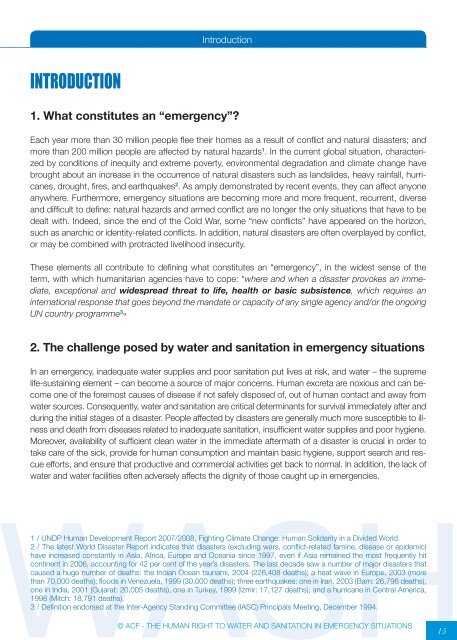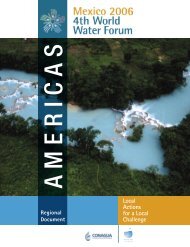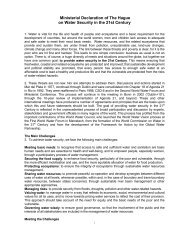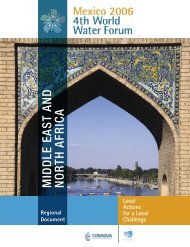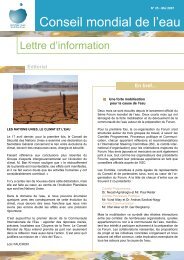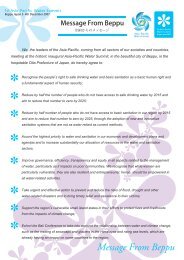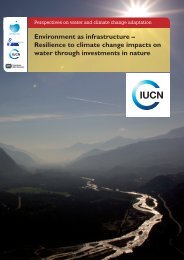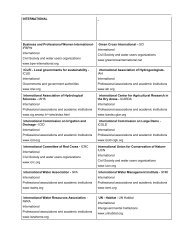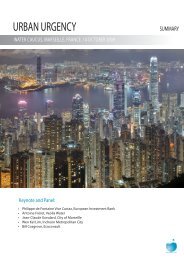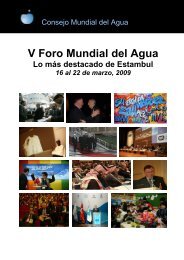the human right to water and sanitation in emergency situations
the human right to water and sanitation in emergency situations
the human right to water and sanitation in emergency situations
Create successful ePaper yourself
Turn your PDF publications into a flip-book with our unique Google optimized e-Paper software.
INTRODUCTION<br />
Introduction<br />
1. What constitutes an “<strong>emergency</strong>”?<br />
Each year more than 30 million people flee <strong>the</strong>ir homes as a result of conflict <strong>and</strong> natural disasters; <strong>and</strong><br />
more than 200 million people are affected by natural hazards 1 . In <strong>the</strong> current global situation, characterized<br />
by conditions of <strong>in</strong>equity <strong>and</strong> extreme poverty, environmental degradation <strong>and</strong> climate change have<br />
brought about an <strong>in</strong>crease <strong>in</strong> <strong>the</strong> occurrence of natural disasters such as l<strong>and</strong>slides, heavy ra<strong>in</strong>fall, hurricanes,<br />
drought, fires, <strong>and</strong> earthquakes 2 . As amply demonstrated by recent events, <strong>the</strong>y can affect anyone<br />
anywhere. Fur<strong>the</strong>rmore, <strong>emergency</strong> <strong>situations</strong> are becom<strong>in</strong>g more <strong>and</strong> more frequent, recurrent, diverse<br />
<strong>and</strong> difficult <strong>to</strong> def<strong>in</strong>e: natural hazards <strong>and</strong> armed conflict are no longer <strong>the</strong> only <strong>situations</strong> that have <strong>to</strong> be<br />
dealt with. Indeed, s<strong>in</strong>ce <strong>the</strong> end of <strong>the</strong> Cold War, some “new conflicts” have appeared on <strong>the</strong> horizon,<br />
such as anarchic or identity-related conflicts. In addition, natural disasters are often overplayed by conflict,<br />
or may be comb<strong>in</strong>ed with protracted livelihood <strong>in</strong>security.<br />
These elements all contribute <strong>to</strong> def<strong>in</strong><strong>in</strong>g what constitutes an “<strong>emergency</strong>”, <strong>in</strong> <strong>the</strong> widest sense of <strong>the</strong><br />
term, with which <strong>human</strong>itarian agencies have <strong>to</strong> cope: “where <strong>and</strong> when a disaster provokes an immediate,<br />
exceptional <strong>and</strong> widespread threat <strong>to</strong> life, health or basic subsistence, which requires an<br />
<strong>in</strong>ternational response that goes beyond <strong>the</strong> m<strong>and</strong>ate or capacity of any s<strong>in</strong>gle agency <strong>and</strong>/or <strong>the</strong> ongo<strong>in</strong>g<br />
UN country programme 3 «<br />
2. The challenge posed by <strong>water</strong> <strong>and</strong> <strong>sanitation</strong> <strong>in</strong> <strong>emergency</strong> <strong>situations</strong><br />
In an <strong>emergency</strong>, <strong>in</strong>adequate <strong>water</strong> supplies <strong>and</strong> poor <strong>sanitation</strong> put lives at risk, <strong>and</strong> <strong>water</strong> – <strong>the</strong> supreme<br />
life-susta<strong>in</strong><strong>in</strong>g element – can become a source of major concerns. Human excreta are noxious <strong>and</strong> can become<br />
one of <strong>the</strong> foremost causes of disease if not safely disposed of, out of <strong>human</strong> contact <strong>and</strong> away from<br />
<strong>water</strong> sources. Consequently, <strong>water</strong> <strong>and</strong> <strong>sanitation</strong> are critical determ<strong>in</strong>ants for survival immediately after <strong>and</strong><br />
dur<strong>in</strong>g <strong>the</strong> <strong>in</strong>itial stages of a disaster. People affected by disasters are generally much more susceptible <strong>to</strong> illness<br />
<strong>and</strong> death from diseases related <strong>to</strong> <strong>in</strong>adequate <strong>sanitation</strong>, <strong>in</strong>sufficient <strong>water</strong> supplies <strong>and</strong> poor hygiene.<br />
Moreover, availability of sufficient clean <strong>water</strong> <strong>in</strong> <strong>the</strong> immediate aftermath of a disaster is crucial <strong>in</strong> order <strong>to</strong><br />
take care of <strong>the</strong> sick, provide for <strong>human</strong> consumption <strong>and</strong> ma<strong>in</strong>ta<strong>in</strong> basic hygiene, support search <strong>and</strong> rescue<br />
efforts, <strong>and</strong> ensure that productive <strong>and</strong> commercial activities get back <strong>to</strong> normal. In addition, <strong>the</strong> lack of<br />
<strong>water</strong> <strong>and</strong> <strong>water</strong> facilities often adversely affects <strong>the</strong> dignity of those caught up <strong>in</strong> emergencies.<br />
1 / UNDP Human Development Report 2007/2008, Fight<strong>in</strong>g Climate Change: Human Solidarity <strong>in</strong> a Divided World.<br />
2 / The latest World Disaster Report <strong>in</strong>dicates that disasters (exclud<strong>in</strong>g wars, conflict-related fam<strong>in</strong>e, disease or epidemic)<br />
have <strong>in</strong>creased constantly <strong>in</strong> Asia, Africa, Europe <strong>and</strong> Oceania s<strong>in</strong>ce 1997, even if Asia rema<strong>in</strong>ed <strong>the</strong> most frequently hit<br />
cont<strong>in</strong>ent <strong>in</strong> 2006, account<strong>in</strong>g for 42 per cent of <strong>the</strong> year’s disasters. The last decade saw a number of major disasters that<br />
caused a huge number of deaths: <strong>the</strong> Indian Ocean tsunami, 2004 (226,408 deaths); a heat wave <strong>in</strong> Europe, 2003 (more<br />
than 70,000 deaths); floods <strong>in</strong> Venezuela, 1999 (30,000 deaths); three earthquakes: one <strong>in</strong> Iran, 2003 (Bam: 26,796 deaths),<br />
one <strong>in</strong> India, 2001 (Gujarat: 20,005 deaths), one <strong>in</strong> Turkey, 1999 (Izmir: 17,127 deaths); <strong>and</strong> a hurricane <strong>in</strong> Central America,<br />
1998 (Mitch: 18,791 deaths).<br />
3 / Def<strong>in</strong>ition endorsed at <strong>the</strong> Inter-Agency St<strong>and</strong><strong>in</strong>g Committee (IASC) Pr<strong>in</strong>cipals Meet<strong>in</strong>g, December 1994.<br />
© ACF - THE HUMAN RIGHT TO WATER AND SANITATION IN EMERGENCY SITUATIONS<br />
15


